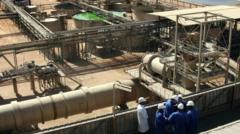In a bold move signaling a shift in Niger's mineral management, the military junta has announced plans to nationalise the Somaïr uranium company, previously operated by France's Orano. The junta, which has been in power since seizing control in 2023, claims that the nationalisation aims to foster healthier and more sustainable resource management, ensuring that the wealth derived from Niger's rich uranium resources benefits its citizens directly.
Niger is recognized as the world’s seventh largest producer of uranium, boasting some of the highest-grade ores in Africa. The decision follows accusations by the junta against Orano, which includes allegations of "irresponsible acts." Furthermore, this movement is part of a broader strategy by Niger's military leaders to distance themselves from their former colonial power, France, while seeking closer ties with international partners like Russia.
Orano currently holds a 63% stake in Somaïr but lost operational control of the mine last year under military directives. Reports indicate that the French state-owned company has initiated legal proceedings against Niger in response to the military's actions, highlighting the tension between the two parties.
Since achieving independence from France in 1960, Niger's management of its uranium resources has been a contentious issue, often viewed as emblematic of foreign domination over national assets. Analysts warn that this recent nationalisation could jeopardize hundreds of local jobs and diminish export income, with long-term implications for the economy. As discussions about the future of the mining sector continue, the ripple effects of this decision are poised to impact both local and international markets significantly.
Niger is recognized as the world’s seventh largest producer of uranium, boasting some of the highest-grade ores in Africa. The decision follows accusations by the junta against Orano, which includes allegations of "irresponsible acts." Furthermore, this movement is part of a broader strategy by Niger's military leaders to distance themselves from their former colonial power, France, while seeking closer ties with international partners like Russia.
Orano currently holds a 63% stake in Somaïr but lost operational control of the mine last year under military directives. Reports indicate that the French state-owned company has initiated legal proceedings against Niger in response to the military's actions, highlighting the tension between the two parties.
Since achieving independence from France in 1960, Niger's management of its uranium resources has been a contentious issue, often viewed as emblematic of foreign domination over national assets. Analysts warn that this recent nationalisation could jeopardize hundreds of local jobs and diminish export income, with long-term implications for the economy. As discussions about the future of the mining sector continue, the ripple effects of this decision are poised to impact both local and international markets significantly.















